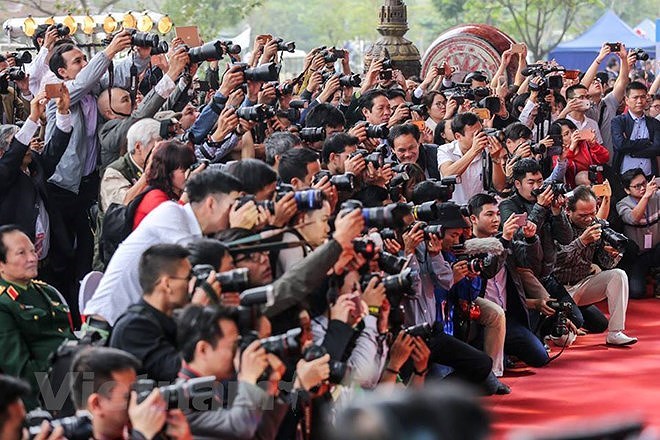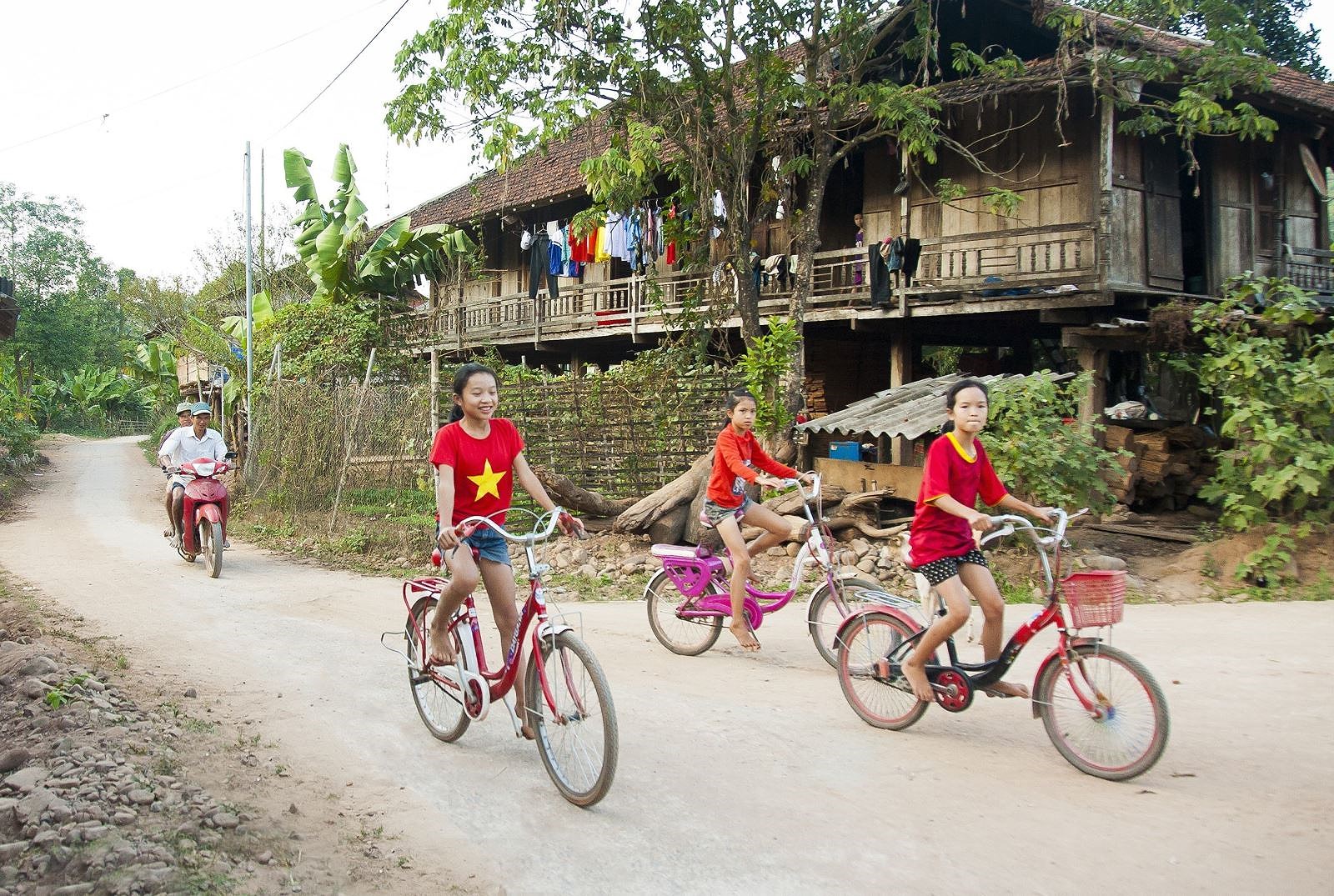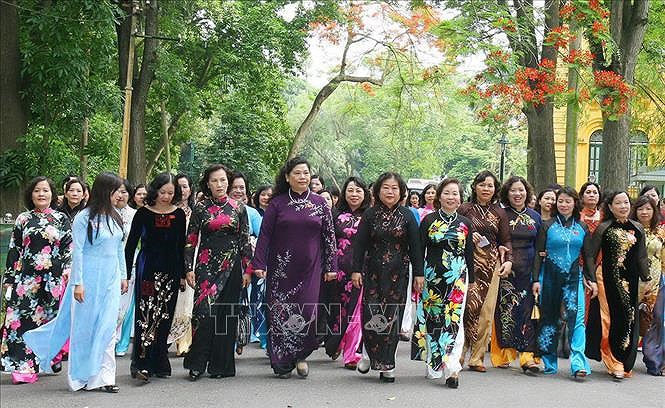Throughout history, Vietnam has always put its people at the centre of every socio-economic development strategy, programme, and project, thereby obtaining considerable and multifaceted achievements in ensuring human rights.
Hanoi (VNA) - Throughout history, Vietnam has always put its people at the centre of every socio-economic development strategy, programme, and project, thereby obtaining considerable and multifaceted achievements in ensuring human rights.
Targets, policies consistently focus on people
In the 1945 Declaration of Independence, then President Ho Chi Minh underscored the association of fundamental human rights with the rights of the people: “All peoples in the world are born equal, every people has the right to live, the right to be happy, and the right to be free.”
The 2013 Constitution featured a whole chapter on human rights and citizens’ rights and obligations, based on which a number of legal documents relevant to human rights have been adopted to create a legal framework for ensuring these rights in reality.
The country has also been enhancing international cooperation to protect and promote human rights. It has taken part in and included in its laws, provisions from almost all UN conventions on human rights, such as the Convention on the Elimination of All Forms of Racial Discrimination, the Convention on the Elimination of All Forms of Discrimination against Women, and the Convention on the Rights of Persons with Disabilities.
Vietnam has been working tirelessly to create infrastructure that better ensures human rights. Meanwhile, every socio-economic development strategy, programme, and project has been centred on and oriented towards the people to serve the people.
People enjoy human rights in best possible manner
 Reporters work at an event (Photo: VNA)
Reporters work at an event (Photo: VNA)
In terms of civil and political rights, the draft Constitution and important laws have been released to collect public feedback, via which people have exercised their freedom and democratic rights.
The rights to freedom of expression, freedom of the press, and access to information of Vietnamese citizens and foreigners in the country are all regulated. The rapid increase in organisations, associations, and clubs proves that people’s right to freedom of association has been respected and ensured. Meanwhile, the State has created the conditions for religious organisations to open schools and dignitary training establishments, publish religious books, and engage in social activities.
Regarding economic, cultural, and social rights, the State of Vietnam has been successfully implementing a number of socio-economic programmes over the past years, thus increasingly ensuring rights for its people and affirming the spirit of “putting the people’s interests above all”.
Vietnam has also made great strides in poverty alleviation, human development, and improvements to living standards, as seen in the household poverty rate coming down to under 3 percent by the end of 2020 and the country’s internationally-recognised impressive outcomes in the realisation of the UN Millennium Development Goal on poverty reduction.
The scale of education has continued to be expanded at all levels and majors to meet growing demand. At the same time, in the cultural aspect, the “All people unite to build a civilised lifestyle” movement has been stepped up, and many heritages nationwide recognised as part of the cultural heritage of humanity.
More and more improvements have been recorded in healthcare, with breakthrough achievements in medical techniques, securing high evaluations from the international community.
 The border district of Nam Po in the northwestern province of Dien Bien has become a bright spot in poverty alleviation (Photo: VNA)
The border district of Nam Po in the northwestern province of Dien Bien has become a bright spot in poverty alleviation (Photo: VNA)
The repatriation of hundreds of thousands of overseas Vietnamese amid the COVID-19 pandemic has demonstrated Vietnam’s efforts to leave no one behind.
With regard to human rights for vulnerable groups, Vietnam was the first in the region and the second in the world to sign the 1989 International Convention on the Rights of the Child. It has called on the entire society to join hands in protecting and caring for children and creating a safe and healthy environment for their physical and mental growth.
Gender equality is another important aspect of human rights. Over the past years, the rates of women enrolled in education at all levels have been on the rise. The country’s reform policies have created conditions for women to be increasingly involved in national socio-economic development activities. In the National Assembly’s 14th tenure (2016-2021), 26.71 percent of legislators were women, higher than the world average of 22.3 percent.
The Government has always worked to assist, care for, and create equal opportunities for the disabled to access education, employment, and healthcare.
Making contributions to common values, progress of humankind
 Female parliamentarians visit the Presidential Palace in Hanoi (Photo: VNA)
Female parliamentarians visit the Presidential Palace in Hanoi (Photo: VNA)
Apart from those achievements, Vietnam has made tireless efforts to contribute to the common values and progress of humanity in terms of human rights.
It has actively taken part in human rights forums at the UN, ASEAN, and other mechanisms, while proactively putting forth relevant initiatives, especially those related to ensuring the rights of women, children, the disabled, and those hit hard by climate change, which have been highly valued by the international community.
The country has also shown its seriousness in realising international commitments on human rights. Since 2008, it has actively participated in the Universal Periodic Review, a mechanism of the UN Human Rights Council to review the protection and promotion of human rights in UN member states.
Caitlin Wiesen, Resident Representative of the UN Development Programme (UNDP) in Vietnam, said the country has been persistently on a development path that focuses on the people and equality in socio-economic development strategies and plans, which has helped it secure a number of achievements in human rights./.